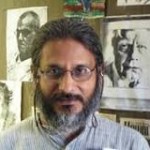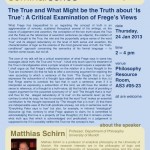 Although a staunch realist in many senses, Gottlob Frege rejected the correspondence theory of truth because it leads to a vicious regress. Donald Davidson has more recently argued that truth (in natural language) is indefinable and any attempt to define truth would be sheer folly. I trace back basic reason why truth could not be defined to Kant’s Critique of Pure Reason.
Although a staunch realist in many senses, Gottlob Frege rejected the correspondence theory of truth because it leads to a vicious regress. Donald Davidson has more recently argued that truth (in natural language) is indefinable and any attempt to define truth would be sheer folly. I trace back basic reason why truth could not be defined to Kant’s Critique of Pure Reason.
Yet, we find in Gangeśa, a 14th century New Nyaya epistemologist, a technically fortified definition of true cognition which seems to escape Frege’s, Davidson’s and Kant’s objections. While truth is not considered a natural universal, Gangeśa definition of truth does not postulate any Fregean thoughts or abstract propositions as bearer of truth. Truth remains an artificial relational property of awareness-episodes. While there is no truth without true acts of believing, it is possible for truth of a piece of knowledge to remain unknown even by the knower. Can Nyaya maintain its realism, without postulating Fregean thoughts or any realm of sense?
This paper is an exercise in comparative philosophical logic of truth and recognition of truth, as it were, through a debate between Nyaya and Frege.
Philosophy Seminar Series.
Date: Thursday, 21 March 2013
Time: 2pm – 4pm
Venue: Philosophy Resource Room (AS3 #05-23)
Speaker: Arindam Chakrabarti, Professor of Philosophy, University of Hawai’i at Manoa
Moderator: Dr. Ben Blumson
About the Speaker:
 Professor Arindam Chakrabarti, having done his M.A. in Philosophy and Mathematical Logic, from Presidency College Kolkata University, earned his D.Phil from Oxford University in 1982, working under Peter Strawson and Michael Dummett. He taught at Calcutta University and at University College London, Seattle and Delhi University, and for the last 15 years, at the University of Hawaii Manoa. After being trained as an analytic philosopher of language at Oxford, Professor Chakrabarti has spent several years receiving traditional training in Indian logic (Navya Nyaya). Prof Chakrabarti has edited or authored six books, in English, Sanskrit, and Bengali, including Denying Existence, Knowing from Words (with B.K. Matilal) Universals, Concepts and Qualities (with Peter Strawson) and has published more than eighty papers and reviews. He is currently working on a book on moral psychology of the emotions and another monograph on the Isha Upanishad.
Professor Arindam Chakrabarti, having done his M.A. in Philosophy and Mathematical Logic, from Presidency College Kolkata University, earned his D.Phil from Oxford University in 1982, working under Peter Strawson and Michael Dummett. He taught at Calcutta University and at University College London, Seattle and Delhi University, and for the last 15 years, at the University of Hawaii Manoa. After being trained as an analytic philosopher of language at Oxford, Professor Chakrabarti has spent several years receiving traditional training in Indian logic (Navya Nyaya). Prof Chakrabarti has edited or authored six books, in English, Sanskrit, and Bengali, including Denying Existence, Knowing from Words (with B.K. Matilal) Universals, Concepts and Qualities (with Peter Strawson) and has published more than eighty papers and reviews. He is currently working on a book on moral psychology of the emotions and another monograph on the Isha Upanishad.

